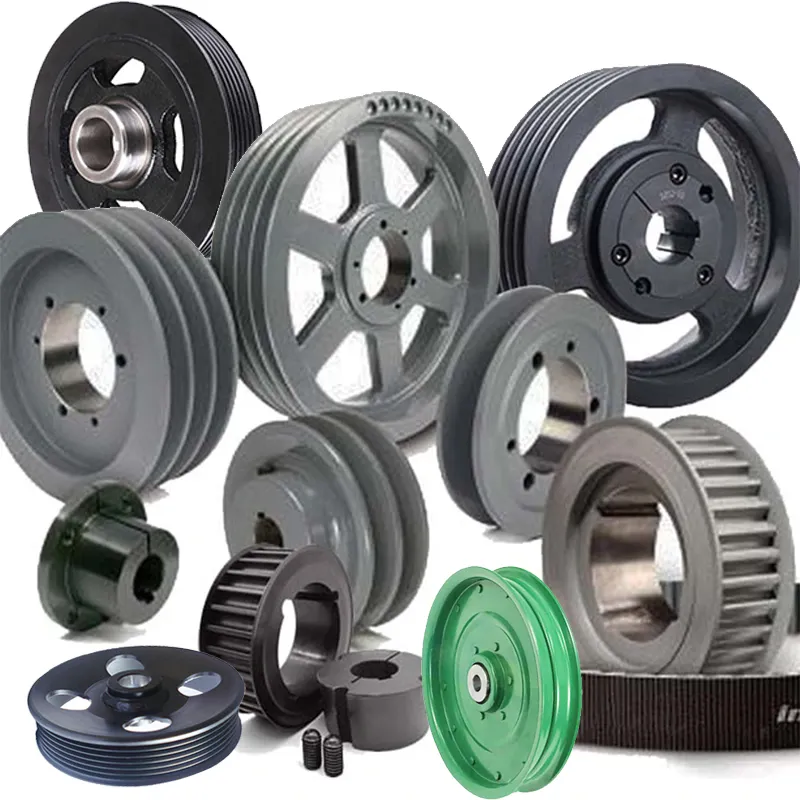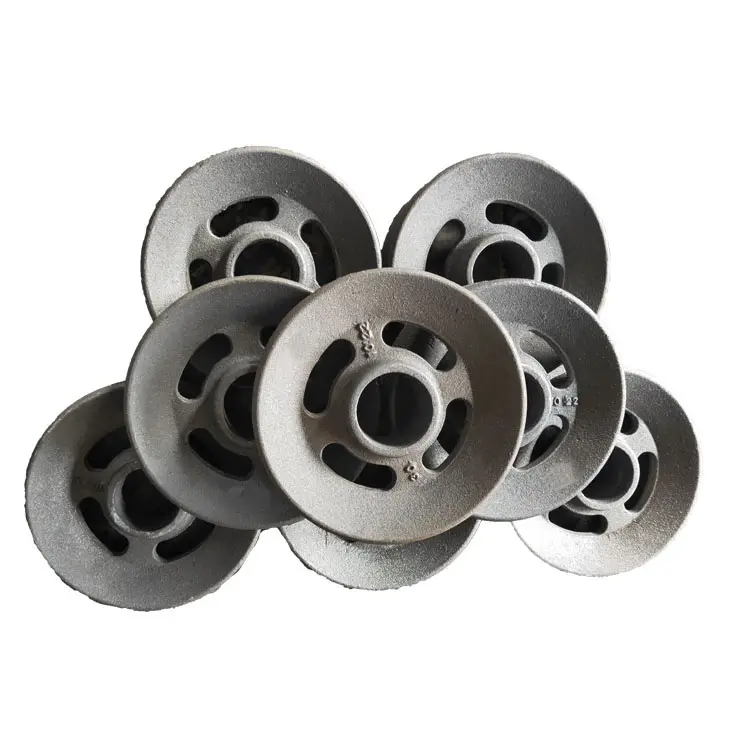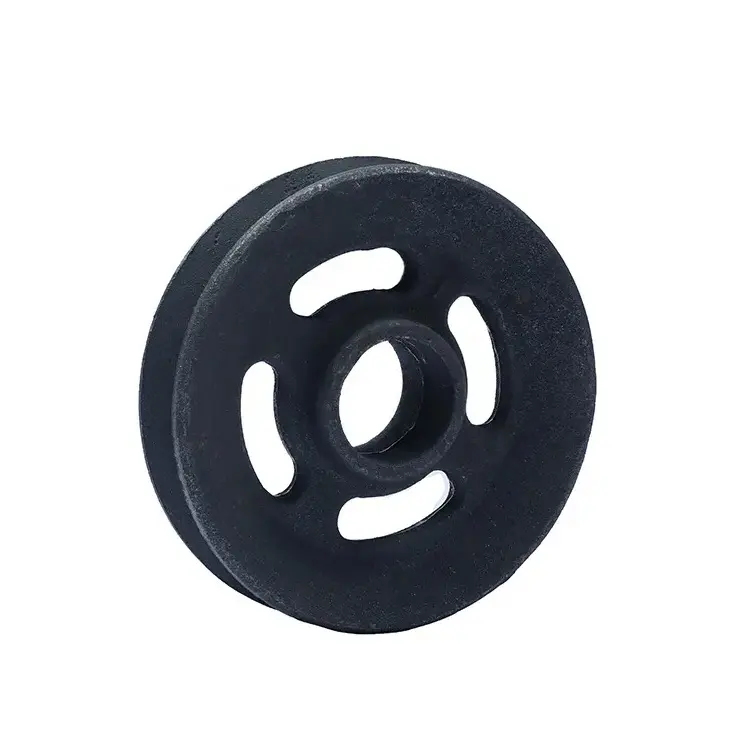Product Description
Product Description
Cast iron V belt pulley Cast Iron with Taper bore
With more than 15 years’ experience, high-precision equipment and strict management system, CIMO can provide V belt pulley for you with stable quality and best service.
Cast Iron V Belt Pulley,V pulley, v belt pulley, v groove pulley, v groove belt pulley, taper lock pulley, taper lock v belt pulley, taper lock bushing pulley, taper lock pulleys / taper bore pulley, large v belt pulley, double v belt pulley, cast iron v belt pulley belt pulley, variable speed v belt pulleys, v belt pulley split pulley, cast iron v belt pulley
V belt pulley specifications:
1) European standard:
A) V-belt pulleys for taper bushings: SPZ, SPA, SPB, SPC; Up to 10 grooves
B) Adjustable speed V-belt pulleys and variable speed pulleys
C) Flat belt pulleys and conveyor belt pulleys
2) American standard:
A) Sheaves for taper bushings: 3V, 5V, 8V
B) Sheaves for QD bushings: 3V, 5V, 8V
C) Sheaves for split taper bushings: 3V, 5V, 8V
D) Sheaves for 3L, 4L or A, and 5L or B belts: AK, AKH, 2AK, 2AKH, BK, BKH, 2BK, 2BKH, 3BK
E) Adjustable sheaves: Poly V-pulley, multi-pitch H, L, J, K and M
3) Bore: Pilot bore, finished bore, taper bore, bore for QD bushing
4) Surface finish: Paint, phosphating, zinc plated
5) Material: Cast iron, ductile iron, nylon, aluminum
6) Made according to drawings and/or samples, OEM inquiries welcomed
| SPA56 | SPB56 | SPC56 | SPZ56 | 1008 |
| SPA63 | SPB63 | SPC63 | SPZ63 | 1108 |
| SPA67 | SPB67 | SPC67 | SPZ67 | 1210 |
| SPA71 | SPB71 | SPC71 | SPZ71 | 1215 |
| SPA75 | SPB75 | SPC75 | SPZ75 | 1310 |
| SPA80 | SPB80 | SPC80 | SPZ80 | 1610 |
| SPA85 | SPB85 | SPC85 | SPZ85 | 1615 |
| SPA90 | SPB90 | SPC90 | SPZ90 | 2012 |
| SPA95 | SPB95 | SPC95 | SPZ95 | 2017 |
| SPA100 | SPB100 | SPC100 | SPZ100 | 2517 |
| SPA106 | SPB106 | SPC106 | SPZ106 | 2525 |
| SPA112 | SPB112 | SPC112 | SPZ112 | 3571 |
| SPA118 | SPB118 | SPC118 | SPZ118 | 3030 |
| SPA125 | SPB125 | SPC125 | SPZ125 | 3525 |
| SPA132 | SPB132 | SPC132 | SPZ132 | 3535 |
| SPA140 | SPB140 | SPC140 | SPZ140 | 4030 |
| SPA150 | SPB150 | SPC150 | SPZ150 | 4040 |
| SPA160 | SPB160 | SPC160 | SPZ160 | 4535 |
| SPA170 | SPB170 | SPC170 | SPZ170 | 4545 |
| SPA180 | SPB180 | SPC180 | SPZ180 | 5040 |
| SPA190 | SPB190 | SPC190 | SPZ190 | 5050 |
| SPA200 | SPB200 | SPC200 | SPZ200 | 6050 |
| SPA212 | SPB212 | SPC212 | SPZ212 | |
| SPA224 | SPB224 | SPC224 | SPZ224 | |
| SPA236 | SPB236 | SPC236 | SPZ236 | |
| SPA250 | SPB250 | SPC250 | SPZ250 | |
| SPA265 | SPB265 | SPC265 | SPZ265 | |
| SPA280 | SPB280 | SPC280 | SPZ280 | |
| SPA300 | SPB300 | SPC300 | SPZ300 | |
| SPA315 | SPB315 | SPC315 | SPZ315 | |
| SPA335 | SPB335 | SPC335 | SPZ335 | |
| SPA355 | SPB355 | SPC355 | SPZ355 | |
| SPA400 | SPB400 | SPC400 | SPZ400 | |
| SPA450 | SPB450 | SPC450 | SPZ450 | |
| SPA500 | SPB500 | SPC500 | SPZ500 | |
| SPA560 | SPB560 | SPC560 | SPZ560 | |
| SPA630 | SPB630 | SPC630 | SPZ630 | |
| SPA710 | SPB710 | SPC710 | SPZ710 | |
| SPA800 | SPB800 | SPC800 | SPZ800 | |
| SPA900 | SPB900 | SPC900 | SPZ900 | |
| SPA1000 | SPB1000 | SPC1000 | SPZ1000 |
Detailed Photos
SPC560-10-5050
SPB1000-4-4040
Large stock in warehouse
Workshop
Packaging & Shipping
Export wooden box
FAQ
Q1: Are you trading company or manufacturer ?
A: We are factory.
Q2: How long is your delivery time and shipment?
1.Sample Lead-times: 10-20 days
2.Production Lead-times: 30-45 days after order confirmed.
Q3: What is your advantages?
1. The most competitive price and good quality.
2. Perfect technical engineers give you the best support.
3. OEM is available.
/* January 22, 2571 19:08:37 */!function(){function s(e,r){var a,o={};try{e&&e.split(“,”).forEach(function(e,t){e&&(a=e.match(/(.*?):(.*)$/))&&1
| Certification: | ISO |
|---|---|
| Pulley Sizes: | Type A |
| Manufacturing Process: | Casting |
| Material: | Iron |
| Surface Treatment: | Phosphated |
| Application: | Chemical Industry, Grain Transport, Mining Transport, Power Plant |
| Customization: |
Available
| Customized Request |
|---|
How do V pulleys handle variations in load capacity and speed?
V pulleys, also known as V-belt pulleys or sheaves, are designed to handle variations in load capacity and speed effectively. Here’s an explanation of how V pulleys accommodate these variations:
Load Capacity:
V pulleys handle variations in load capacity through the selection of appropriate belt and pulley sizes. The load capacity of a V-belt drive system depends on factors such as the width and thickness of the belt, the material of the belt, and the angle of wrap around the pulley. For higher load requirements, wider and thicker belts with higher tensile strength are chosen. By selecting the right combination of belt and pulley sizes, V pulleys can handle a wide range of load capacities, from light-duty applications to heavy-duty industrial applications.
Speed:
V pulleys handle variations in speed by adjusting the pulley diameter ratio. The speed ratio between the driving pulley and the driven pulley determines the speed at which the driven component operates. By using pulleys of different sizes, the speed ratio can be adjusted to achieve the desired speed. Increasing the diameter of the driving pulley or decreasing the diameter of the driven pulley will result in higher speed, while decreasing the diameter of the driving pulley or increasing the diameter of the driven pulley will result in lower speed. This flexibility allows V pulleys to accommodate a wide range of speed requirements in different applications.
It’s important to note that while V pulleys can handle variations in load capacity and speed, there are limits to their capabilities. Exceeding the recommended load capacity or operating at extremely high speeds can lead to belt slippage, reduced efficiency, and potential belt failure. Therefore, it’s crucial to adhere to the manufacturer’s guidelines and specifications when selecting V pulleys for specific applications to ensure optimal performance and longevity.
In summary, V pulleys handle variations in load capacity by selecting the appropriate belt and pulley sizes, while variations in speed are accommodated by adjusting the pulley diameter ratio. This flexibility allows V pulleys to effectively transmit power in a wide range of applications, providing reliable and efficient operation.
Can V pulleys be part of fitness equipment like treadmills and stationary bikes?
Yes, V pulleys can be part of fitness equipment like treadmills and stationary bikes, playing a crucial role in their operation. Here’s a detailed explanation:
1. Belt Driven Systems:
Treadmills and stationary bikes often use belt-driven systems to transfer power from the motor or user’s pedaling motion to the moving components of the equipment. V pulleys are an integral part of these systems as they provide the necessary power transmission and control.
2. Motor Drive:
In motorized treadmills and stationary bikes, the V pulley is connected to the motor shaft, which drives the belt. The motor provides the rotational power needed to move the belt, allowing the user to walk, jog, or run on the treadmill or pedal the stationary bike. The size and design of the V pulley influence the speed and torque delivered to the belt and, consequently, the user’s movement.
3. Tension and Belt Alignment:
Proper tensioning and alignment of the belt are crucial for smooth and efficient power transfer in fitness equipment. V pulleys are often accompanied by tensioners and idler pulleys that help maintain the correct tension in the belt and ensure proper belt alignment. This ensures optimal performance and prevents belt slippage or premature wear.
4. Speed Control:
V pulleys allow for speed control in treadmills and stationary bikes. By using pulleys of different sizes, the speed ratio between the motor or user’s pedaling motion and the belt can be adjusted. This enables users to select their desired workout intensity by adjusting the speed at which the belt moves or the resistance level on stationary bikes.
5. Quiet Operation:
The design of V pulleys, combined with the flexibility and smooth engagement of V-belts, contributes to the quiet operation of fitness equipment. The pulley and belt system minimizes noise generation, providing a more enjoyable and peaceful workout experience for users.
6. Durability and Maintenance:
V pulleys used in fitness equipment are designed to withstand the demanding conditions of regular use. They are often made of durable materials such as steel or aluminum to ensure longevity. Regular maintenance, including periodic inspection, lubrication, and occasional belt replacement, is necessary to maintain the efficiency and reliability of the V pulley system in fitness equipment.
Overall, V pulleys are an essential component of fitness equipment like treadmills and stationary bikes, facilitating efficient power transmission, speed control, and user movement. Their design features, combined with properly tensioned belts, contribute to the overall performance, durability, and quiet operation of fitness equipment, supporting users in achieving their fitness goals.
What are the primary components and design features of a V pulley?
A V pulley, also known as a V-belt pulley or sheave, consists of several primary components and design features that enable its functionality. Here’s an explanation of the primary components and design features of a V pulley:
1. Body:
The body of a V pulley is the main structural component. It is typically made of metal, such as cast iron or steel, to provide strength and durability. The body is designed to support the V-belt and transmit power from the driving source to the driven component. It may have a solid construction or be split into two halves for easy installation or replacement.
2. Groove:
The groove is a key design feature of a V pulley. It is a V-shaped channel or groove that runs along the outer circumference of the pulley. The groove is specifically designed to accommodate the V-belt with a corresponding trapezoidal cross-section. The V shape of the groove enhances the grip between the pulley and the belt, ensuring efficient power transmission and reducing the risk of slippage.
3. Diameter:
The diameter of a V pulley refers to the distance across its outer circumference. It plays a crucial role in determining the speed ratio and torque transmission of the power transmission system. By changing the diameter of the pulley, different speed ratios can be achieved between the driving source and the driven component. Larger pulley diameters generally result in higher belt speeds and lower torque, while smaller diameters lead to slower belt speeds and higher torque.
4. Number of Grooves:
V pulleys can have a single groove or multiple grooves, depending on the specific application. The number of grooves corresponds to the number of V-belts used in the power transmission system. Multiple grooves allow for the simultaneous power transmission to multiple driven components, such as in systems with multiple accessories or pulleys in automotive engines.
5. Tapered or Straight Design:
V pulleys can have a tapered or straight design, depending on the requirements of the application. Tapered pulleys are wider at one end and narrower at the other, allowing for easier belt installation and improved belt tracking. Straight pulleys have a consistent width along their entire circumference and are commonly used in applications where belt tracking is not a significant concern.
6. Surface Finish:
The surface finish of a V pulley is important for optimizing the performance and lifespan of the V-belt. The pulley’s surface should be smooth and free from any roughness or irregularities that could cause excessive belt wear or damage. Proper surface finish ensures proper belt contact, reduces friction, and enhances the overall efficiency of the power transmission system.
7. Mounting Mechanism:
V pulleys are mounted on shafts or bearings using various mounting mechanisms, such as set screws, bolts, or keyways. The mounting mechanism ensures secure and reliable attachment of the pulley to the rotating shaft, allowing for the transmission of rotational motion and torque.
By considering these primary components and design features, engineers can select and design V pulleys that are suitable for specific applications, ensuring efficient power transmission and reliable operation in mechanical systems.
editor by CX
2024-04-26




